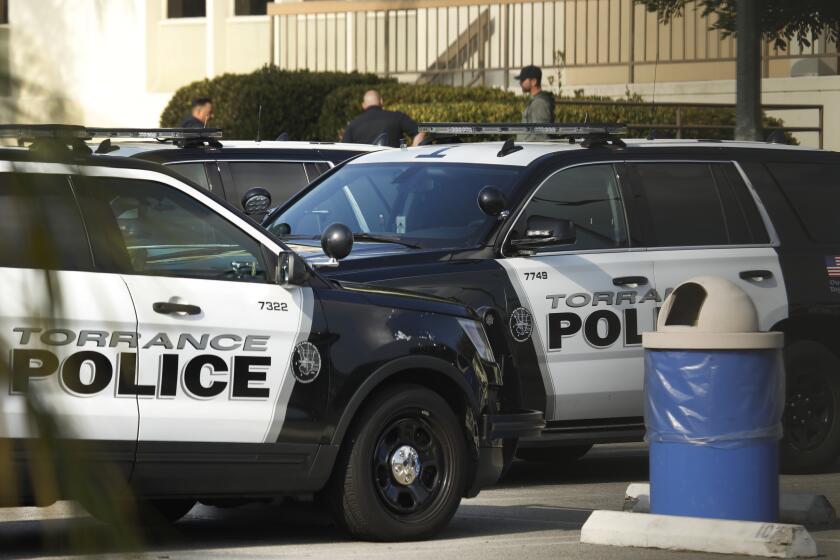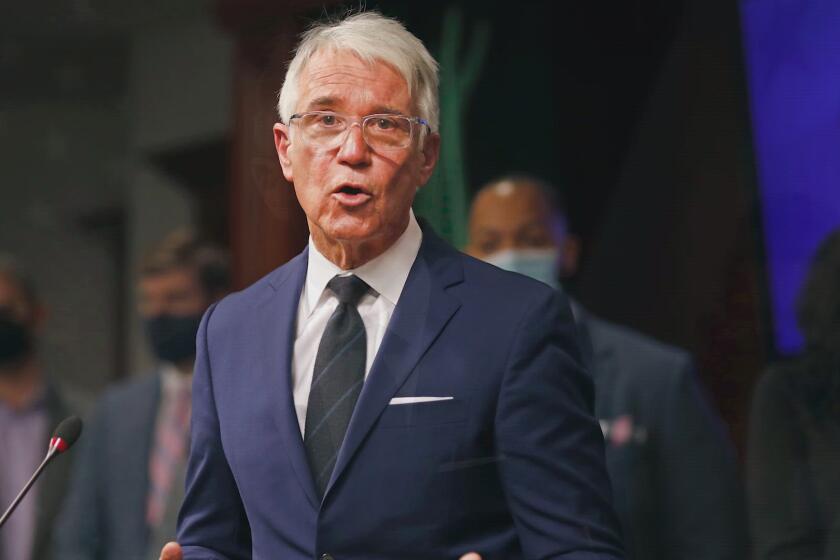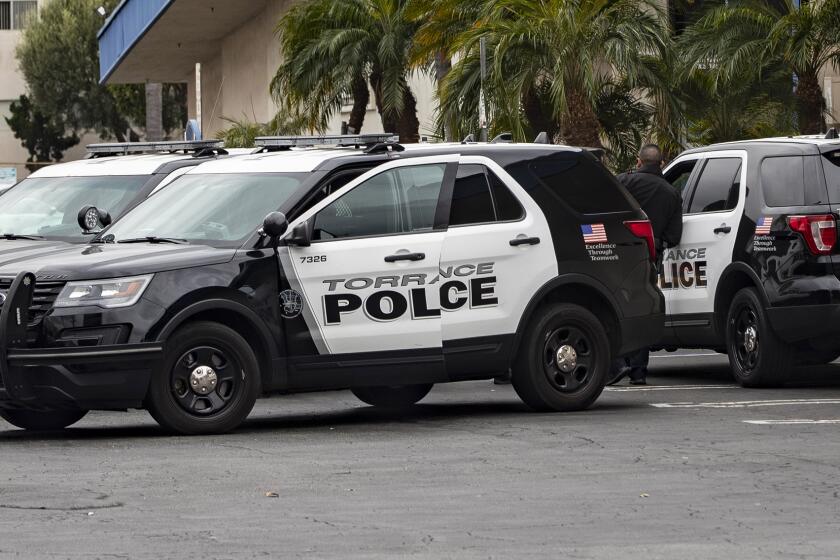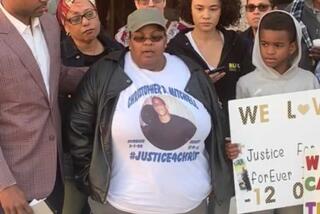Torrance cops face manslaughter charges in killing of Christopher Deandre Mitchell
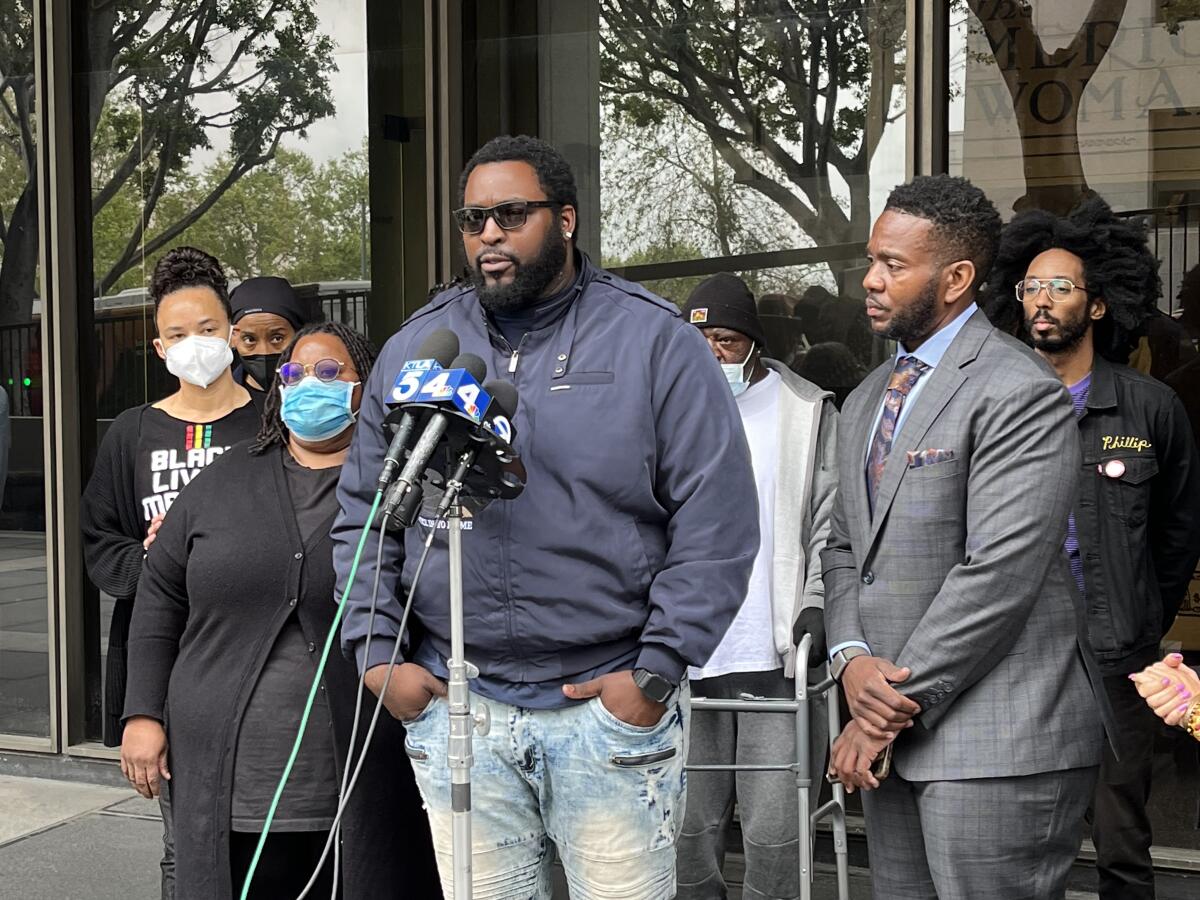
Two Torrance police officers will face manslaughter charges in a 2018 shooting, after Los Angeles County Dist. Atty. George Gascón decided to reopen a case his predecessor declined to prosecute, according to an indictment unsealed Monday.
A grand jury indicted Matthew Concannon and Anthony Chavez on one count each of voluntary manslaughter in the shooting death of Christopher Deandre Mitchell, who was sitting in a suspected stolen car with an air rifle between his knees when the officer opened fire, court records show.
The indictment was returned March 24. Each officer faces a maximum of 11 years in prison if convicted.
The officers pleaded not guilty during a brief arraignment in downtown L.A. Monday morning. The courtroom was lined with many of Mitchell’s loved ones, including his mother, and several organizers with Black Lives Matter Los Angeles, which has vociferously protested the shooting for years.
Former Dist. Atty. Jackie Lacey decided not to prosecute Concannon and Chavez in 2019, but the case was one of four Gascón hired a special prosecutor to reopen when he was elected in 2020.
“It’s been a long time coming. It’s been a rough journey. My heart, my soul, is deeply hurting. So bad. I miss my son … so much. My son’s life was stolen by Matthew Concannon and Anthony Chavez,” Mitchell’s mother, Sherilyn Haines said during a Monday news conference. “He didn’t get a chance to live his best life.”
In December 2018, Concannon and Chavez were responding to reports of a man driving a stolen vehicle and came upon Mitchell in a Ralph’s parking lot in Torrance, according to an earlier district attorney’s office memo clearing the officers of wrongdoing.
A grand jury will consider charges this week against two former Torrance police officers in the 2018 killing of Christopher DeAndre Mitchell.
The officers parked behind Mitchell, exited their vehicle and yelled, “Police!” Mitchell initially placed his hands on the steering wheel, according to the memo.
The officers repeatedly ordered Mitchell to get out of the car, but he did not comply, according to the report. When they approached him, the officers noticed Mitchell’s hands move toward his lap, where Concannon saw what he believed to be a firearm. Both officers then shot Mitchell at close range, killing him.
The officers described the weapon, later determined to be a “break barrel air rifle,” as “pinched” between Mitchell’s legs, though neither alleged he grabbed it or pointed it at them before they shot him.
“Based on Mitchell’s failure to follow the officers’ directions, his continued efforts to conceal the object in his lap, the physical appearance of the object, and the movement of his hands toward the object, it was reasonable for the officers to believe that the object was a firearm and to respond with deadly force,” prosecutors wrote in 2019.
Mitchell’s supporters have pushed back on some of the details in the 2019 memo, insisting he obeyed commands and was asleep when officers first approached him. Sheila Bates, a Black Lives Matter organizer, said Monday the officers unnecessarily escalated the situation despite Mitchell not making any threatening actions, and opened fire within seconds of approaching him.
The reasoning behind the new charges was not immediately clear. Special prosecutor Lawrence Middleton has declined to discuss the case publicly, and transcripts of the grand jury hearing that led to indictment will remain under seal for at least 10 days. During a brief Monday news conference, Gascón referred nearly every question asked of him to Middleton, though he did say he had questions about “whether the officers were able to see the gun before the shooting.”
The officers’ attorneys dismissed the filing as political in nature, noting Gascón announced he would reopen the case during his 2020 election bid.
“There must be new evidence, but Mr. Gascón, through the special prosecutor, has repeatedly refused to provide it to us. Unless he can provide something new, this would appear to be a politically motivated and financially incentivized rank abuse of prosecutorial power,” said Concannon’s attorney, Lisa Houlé, in a statement.
L.A. County Dist. Atty. George Gascón promised to hold police accountable. While he has aggressively pursued police misconduct, questions loom.
Since taking office, Gascón has filed charges against police officers in seven cases in which a person either died in police custody or was shot by an on-duty law enforcement officer, something that happened just twice in the past two decades. But questions linger about his ability to win convictions in such cases and his management of the unit that prosecutes police officers.
Chavez’s attorney, Tom Yu, said he plans to file a motion to dismiss the case due to insufficient evidence and procedural violations committed by Middleton. Middleton is required by law to present a grand jury with exculpatory evidence provided by defense attorneys, and Yu claimed transcripts show the special prosecutor did not present everything the defense team provided.
Concannon and Chavez have both been linked to a racist texting scandal inside the Torrance Police Department, after an investigation revealed roughly 15 officers sent approximately 390 racist, sexist and homophobic messages from 2018 to 2020.
The messages included jokes about setting up Black men to be killed, with one officer suggesting he wanted to shoot and hang several Black suspects, and a picture of a teddy bear being lynched inside the police departments headquarters, according to documents previously reviewed by The Times.
Eight months after The Times revealed racist texts by Torrance police officers, city officials have done little to hold them accountable.
While The Times never found evidence that Concannon or Chavez sent any of the messages, they were both under investigation as part of the scandal, according to documents previously reviewed by the newspaper and sources who spoke on the condition of anonymity.
Messages sent by unidentified officers used the N-word to describe Mitchell’s loved ones and celebrated other officers’ decision to use force against protesters who supported Mitchell’s family during a demonstration in front of the Torrance City Council. Several of the officers who used racist language in the messages were also later accused of using excessive force against protesters in civil lawsuits.
“This case is clearly a murder case, and the text messaging scandal which included messages about Christopher and his family speak volumes about the racist nature of the Torrance Police Department,” said Bates, who was arrested and injured during the City Council protest.
Yu declined to comment on Chavez’s involvement in the scandal. Houlé said her client only replied “Lmao” to one text in the thread and otherwise did not send any racist messages. Although the texts were uncovered in the years between Mitchell’s death and Monday’s court hearing, Houlé said they were “irrelevant” to the manslaughter case.
Chavez is no longer a Torrance police officer, records show. Concannon was placed on administrative leave after news of the indictment broke last week, according to Houlé.
Gascón’s decision to pursue a case that his predecessor declined to file is a legal rarity, but experts said it’s unclear how much Lacey’s past decision-making would weigh on a new criminal case.
“I’m not sure how easily the defense will get that in front of a jury … I don’t know that it would be admissible. I don’t know that it’s relevant,” said Laurie Levenson, a former federal prosecutor and professor at Loyola Law School.
“I’m not sure how that goes in front of a jury, and it might come down to in cross-examining individual witnesses that there were problems before in evaluating some of the cases,” she said. “But I don’t think the defense will be able to say, ‘Didn’t your office reject this before?’ ”
More to Read
Sign up for Essential California
The most important California stories and recommendations in your inbox every morning.
You may occasionally receive promotional content from the Los Angeles Times.
